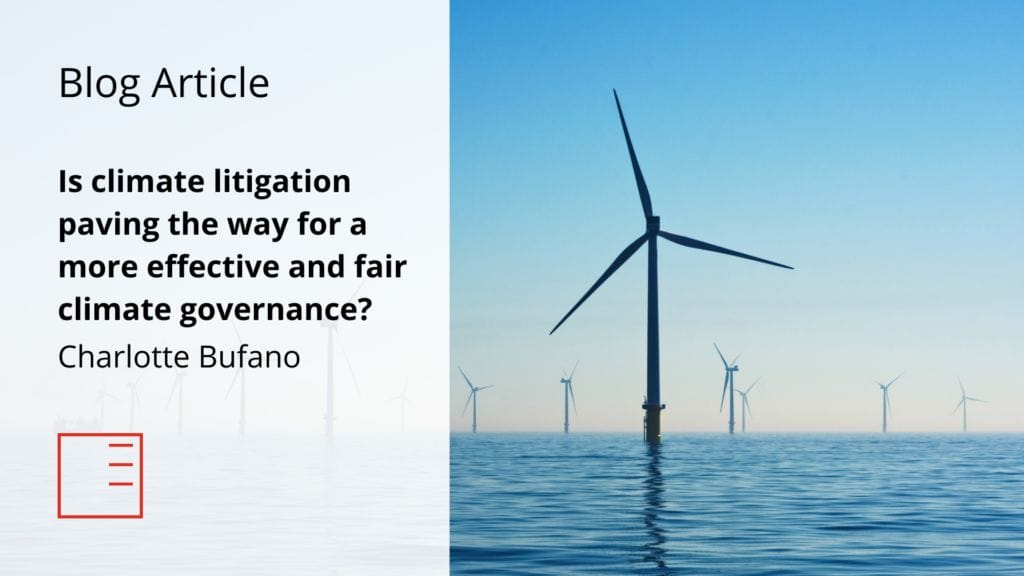Is climate litigation paving the way for a more effective and fair climate governance?

Is climate litigation paving the way for a more effective and fair climate governance?
Over the past months, a growing number of court cases have emerged in favour of climate change mitigation. Holding fossil fuel companies accountable for their greenhouse gas emissions constitutes a much-needed step forward. But do these lawsuits constitute a real victory? Or is it a sign that, when courts go mainstream, politics is not doing enough?
As the latest NDC Synthesis Report highlights, globally there is a vast gap between the emissions reduction targets being promised and the policies in place to achieve them: governments’ commitments made to date fall far short of what is required to reach carbon neutrality by 2050 and limit the long-term increase in the average global temperature to 1.5˚C, as enshrined in the Paris Agreement. More ambition is thus needed, which implies that the major polluting companies also need to align with the objectives of the above-mentioned treaty. The energy transition, while maintaining the economic competitiveness of countries (especially of those that rely on fossil fuels), must also be socially balanced and fair, in order to not only combat inequalities within and among countries, but also among present and future generations.
Human rights go mainstream with climate change
On 26 May 2021, in a landmark lawsuit brought by Friends of the Earth Netherlands and over 17,000 co-plaintiffs, Royal Dutch Shell was ordered to cut its global carbon emissions by 45% by the end of 2030 compared with 2019 levels and to align with the Paris Agreement. This is the first time in history that a fossil fuel firm has been legally held responsible for driving the climate crisis and, moreover, on the basis of international human rights standards.
Until recently, lawsuits were focused on liability, with corporations only asked to pay damages for past behaviour. But the legal case against Shell is among a growing number of so-called human rights-based cases, which aim to radically change a company’s strategy and potentially disrupt its business model. Judge Larisa Alwin of the district court in The Hague, in fact, said that “a change of policy” from the company that could “curb the potential growth of the Shell group” is required. She also found the company’s existing climate strategy not concrete enough and added that “companies have the responsibility to respect human rights.” Shell’s total greenhouse gas emissions were 1.65 billion tons of carbon dioxide equivalent in 2019, around the same as Russia’s, the world’s fourth-largest polluter.
Another landmark climate lawsuit, that heads in the same direction, is the one carried out by an 86-year-old nun and eight schoolchildren to prevent Sussan Ley, Australia’s Minister for Environment, from making a decision on whether to grant approvals for the expansion of Whitehaven’s Vickery coal mine in New South Wales. The expected mine’s activities, 10m tonnes of coal annually over 26 years, would have resulted in the emission of roughly 370m tonnes of CO2. In the light of such evidence, Justice Mordecai Bromberg agreed that the government had a duty to take “reasonable care” to protect children from the “severe harms” these activities cause to Earth’s climate. He added that “[…] the inaction of this generation of adults […] might fairly be described as the greatest intergenerational injustice ever inflicted by one generation of humans upon the next”.
It is to be highlighted that enterprises are bound by the corporate human rights due diligence and, therefore, they have to proactively manage potential and actual adverse human rights impacts with which they are involved. This duty is enshrined in two instruments, the UN Guiding Principles on Business and Human Rights and in the OECD Guidelines for Multinational Enterprises. Although neither of them explicitly mentions climate change, it is widely accepted that businesses have the responsibility to identify, prevent, mitigate, and account for climate change. Among the relevant aspects mentioned so far, these lawsuits can also be considered a milestone precisely because they demonstrate and strengthen this acceptance, alongside with strengthening the Intergenerational Equity Principle and the connections between the human rights and climate change regimes.
Justice for a better climate practice
There’s no doubt that the rulings could set a precedent for similar cases against the world’s biggest corporate polluters, which may now face similar lawsuits. Climate progress has for long been at a deadlock and corporate delaying tactics have been one of the main culprits. Moreover, it is hoped that the lawsuits will highlight the critical importance of integrating the human rights dimension in discussions at the UNFCCC COP26 and beyond.
Climate change is defined as a “common concern of humankind”: this entails that the action needed to tackle it should be comprehensive. Instead, we observe that misleading behaviours, such as free riding, are still common among states and businesses. And climate treaties are vulnerable to such phenomena as well. For example, the characteristics of the Paris Agreement’s control mechanism (Articles 13-15), that “shall be implemented in a facilitative, non-intrusive, non-punitive manner, respectful of national sovereignty […]”, raise serious concerns about the effectiveness of the mechanism itself and of the entire treaty.
Hence, the enforcement of such rulings could, from a top-down perspective, fill in the gaps of past climate policies while contributing to elaborating stricter ones and, from a bottom-up perspective, help reduce the lack of public trust in governments, that may be one of the fundamental barriers to effective environmental action. Looking ahead, it is worth mentioning that the recent landmark lawsuits could boost the negotiations regarding the modernization of the Energy Charter Treaty, the adoption of the Sustainable Corporate Governance initiative, and the approval of the legal definition of “Ecocide”.
You may find the article here.




